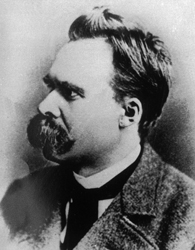“Nietzsche’s actual thought is a…system, at the beginning of which stands the death of God…the ensuing nihilism, and at its end the self-surmounting of nihilism in eternal recurrence,” Nietzsche scholar Karl Lowith once wrote, capturing the intensity, depth and wildly compelling contradictions inherent in the German philosopher’s oeuvre. To this day, Friedrich Nietzsche is considered one of the most influential Western thinkers.
Friedrich Nietzsche’s Early Days
Friedrich Nietzsche was born on October 15, 1844, in a rural area outside of Leipzig, Germany. His father was the town minister, and his uncles and grandfathers were also Lutheran ministers; in fact, his paternal grandfather was a respected Christian scholar. Nietzsche himself would later go on to reject the entire Christian faith.
As a teenager, Nietzsche went to a boarding school where he fostered his love of literature and music. He went on to college at the University of Bonn where he studied theology and philology, focusing on the latter. It was in college that he first read Arthur Schopenhauer’s “The World as Will and Representation,” a work that many scholars believe greatly influenced Nietzsche’s intellectual pursuits in the realm of metaphysics.
Nietzsche’s published works were so accomplished that he secured a position as a professor of philology in Basel, Switzerland, even though he hadn’t even written a dissertation. He took a brief leave to serve in the military; he soon became severely ill and returned to teaching. During these years, he developed a friendship with musician Richard Wagner. Nietzsche’s continued poor health forced him to leave the university in 1879. Soon after that, he published his first book, “The Birth of Tragedy.” The book was greatly influenced by Wagner, and marked a distinct break with the academic tradition.
Sources in this Story
- Stanford Encyclopedia of Philosophy: Friedrich Nietzsche
- Encyclopedia Britannica: Friedrich Nietzsche
- New York Public Library: Nietzsche: A Selected Annotated Bibliography
- University of Pittsburgh: The perspectives of Nietzsche
- Fordham University: New Nietzsche Studies
Nietzsche’s Notable Accomplishments
Nietzsche initially established himself as a visionary in the fields of art and music, but he eventually one of the most influential writers and thinkers in modern philosophy. The New York Public Library’s Selected Annotated Bibliography quotes philosopher Martin Heidegger in noting that it is “Nietzsche, in whose light and shadow all of us today, with our ‘for him’ or ‘against him’ are thinking and writing.”
As evidenced by this University of Pittsburgh page about the Perspectives of Nietzsche, Nietzsche expounded on nearly every important subject of human understanding, and his perspective was often dark. In “Human, All Too Human,” he wrote, “People who comprehend a thing to its very depths rarely stay faithful to it forever. For they have brought its depths into the light of day: and in the depths there is always much that is unpleasant to see.”
Nietzsche’s lasting contributions include dismissals of Christianity and democracy, and a revolutionary, often incendiary interpretation of what it means to be human. The Stanford Encyclopedia calls him “one of the first existentialist philosophers.”
The Man and his Work
- “The Birth of Tragedy”
- “On the Genealogy of Morals” and “Ecce Homo”
- “Beyond Good and Evil”
- “Nietzsche: The Man and his Philosophy” by R.J. Hollingdale
- “Conversations with Nietzsche: A Life in the Words of His Contemporaries” ed. by Sander L. Gilman
The Rest of the Story
Although Nietzsche finally succumbed at the age of 55 to the bad health that had plagued him all his life, his legacy has lived on in the continued study of his thought. Freud’s psychoanalytic theory was greatly influenced by Nietzsche. The Nazis attempted to co-opt Nietzsche’s work to justify their actions. Contemporary scholars still debate the topics of discussion he initiated in the late 19th century. Societies and journals, such as New Nietzsche Studies, published by the Fordham University Nietzsche Society, seek new insights from the philosopher’s work.
This article was originally written by Rachel Balik; it was updated October 17, 2017.











